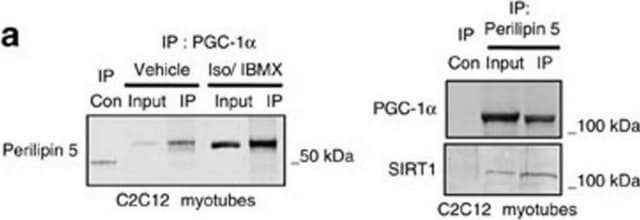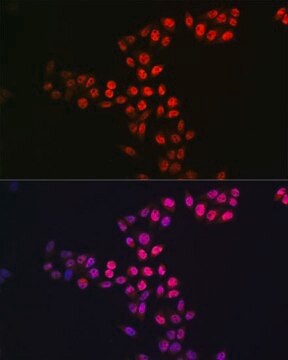04-1557
Anti-SIRT1 Antibody, clone 10E4
clone 10-E-4, from mouse
Synonym(s):
SIR2-like protein 1, sir2-like 1, sirtuin (silent mating type information regulation 2 homolog) 1 (S. cerevisiae), sirtuin (silent mating type information regulation 2, S. cerevisiae, homolog) 1, sirtuin 1, sirtuin type 1
About This Item
Recommended Products
biological source
mouse
Quality Level
antibody form
purified immunoglobulin
antibody product type
primary antibodies
clone
10-E-4, monoclonal
species reactivity
mouse, human
packaging
antibody small pack of 25 μL
technique(s)
ChIP: suitable
immunocytochemistry: suitable
immunohistochemistry: suitable
immunoprecipitation (IP): suitable
western blot: suitable
NCBI accession no.
UniProt accession no.
shipped in
ambient
target post-translational modification
unmodified
Gene Information
human ... SIRT1(23411)
General description
Specificity
Immunogen
Application
Chromatin Immunopreiciptiation: Reported by independent researcher using representative lot.
Immunohistochemistry: Reported by independent researcher using representative lot.
Epigenetics & Nuclear Function
Histones
Quality
Western Blot Analysis: 0.5 µg/ml of this antibody detected SIRT1 on 10 µg of HeLa cell lysate.
Target description
Physical form
Storage and Stability
Analysis Note
HeLa cell lysate
Other Notes
Disclaimer
Not finding the right product?
Try our Product Selector Tool.
recommended
Certificates of Analysis (COA)
Search for Certificates of Analysis (COA) by entering the products Lot/Batch Number. Lot and Batch Numbers can be found on a product’s label following the words ‘Lot’ or ‘Batch’.
Already Own This Product?
Find documentation for the products that you have recently purchased in the Document Library.
Our team of scientists has experience in all areas of research including Life Science, Material Science, Chemical Synthesis, Chromatography, Analytical and many others.
Contact Technical Service







